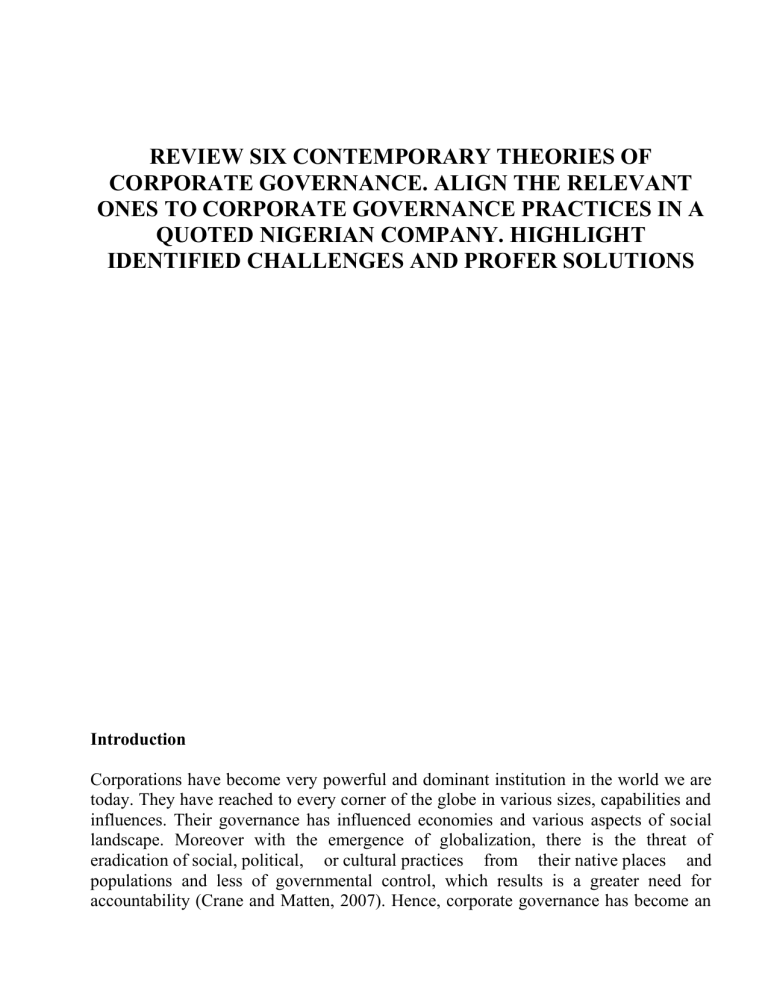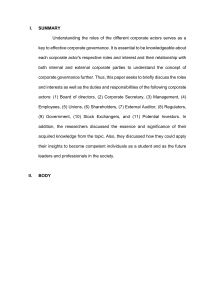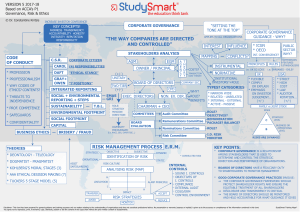
REVIEW SIX CONTEMPORARY THEORIES OF CORPORATE GOVERNANCE. ALIGN THE RELEVANT ONES TO CORPORATE GOVERNANCE PRACTICES IN A QUOTED NIGERIAN COMPANY. HIGHLIGHT IDENTIFIED CHALLENGES AND PROFER SOLUTIONS Introduction Corporations have become very powerful and dominant institution in the world we are today. They have reached to every corner of the globe in various sizes, capabilities and influences. Their governance has influenced economies and various aspects of social landscape. Moreover with the emergence of globalization, there is the threat of eradication of social, political, or cultural practices from their native places and populations and less of governmental control, which results is a greater need for accountability (Crane and Matten, 2007). Hence, corporate governance has become an important factor in managing organizations in the current global and complex environment. Besides the aforementioned, the scandals in Enron, WorldCom, Cadbury Nigeria Plc, Intercontinental Bank, Afribank, and Oceanic Bank have reiterated the value of good governance practices in corporations In order to understand corporate governance, it is important to highlight its definition. Even though, there is no single accepted definition of corporate governance but it can be defined as the system by which companies are directed and controlled. Boards of directors are responsible for the governance of their companies. The shareholders’ role in governance is to appoint the directors and the auditors and to satisfy themselves that an appropriate governance structure is in place. The responsibilities of the board include setting the company’s strategic aims, providing the leadership to put them into effect, supervising the management of the business and reporting to shareholders on their stewardship. Corporate governance is therefore about what the board of a company does and how it sets the values of the company, and it is to be distinguished from the day to day operational management of the company by full-time executives. But good governance can have wider impacts to the non-listed sector because it is fundamentally about improving transparency and accountability within existing systems. One of the interesting developments in the last few years has been the way in which the ‘corporate’ governance label has been used to describe governance and accountability issues beyond the corporate sector. Corporate Governance could also be the process of decision making and the process by which decisions are implemented in large businesses is known as Corporate Governance. There are various theories which describe the relationship between various stakeholders of the business while carrying out the activity of the business. Theories of Corporate Governance Agency Theory Stewardship Theory Resource Dependency Theory Stakeholder Theory Transaction Cost Theory Political Theory Agency Theory: Agency theory defines the relationship between the principals (such as shareholders of company) and agents (such as directors of company). According to this theory, the principals of the company hire the agents to perform work. The principals delegate the work of running the business to the directors or managers, who are agents of shareholders. The shareholders expect the agents to act and make decisions in the best interest of principal. On the contrary, it is not necessary that agent make decisions in the best interests of the principals. The agent may be succumbed to self-interest, opportunistic behavior and fall short of expectations of the principal. The key feature of agency theory is separation of ownership and control. The theory prescribes that people or employees are held accountable in their tasks and responsibilities. Rewards and Punishments can be used to correct the priorities of agents. Stewardship Theory: The steward theory states that a steward protects and maximises shareholders wealth through firm performance. Stewards are company executives and managers working for the shareholders, protects and make profits for the shareholders. The stewards are satisfied and motivated when organizational success is attained. It stresses on the position of employees or executives to act more autonomously so that the shareholders’ returns are maximized. The employees take ownership of their jobs and work at them diligently. Resource Dependency Theory: The Resource Dependency Theory focuses on the role of board directors in providing access to resources needed by the firm. It states that directors play an important role in providing or securing essential resources to an organization through their linkages to the external environment. The provision of resources enhances organizational functioning, firm’s performance and its survival. The directors bring resources to the firm, such as information, skills, access to key constituents such as suppliers, buyers, public policy makers, social groups as well as legitimacy. Directors can be classified into four categories of insiders, business experts, support specialists and community influential. Stakeholder Theory: Stakeholder theory incorporated the accountability of management to a broad range of stakeholders. It states that managers in organizations have a network of relationships to serve – this includes the suppliers, employees and business partners. The theory focuses on managerial decision making and interests of all stakeholders have intrinsic value, and no sets of interests is assumed to dominate the others. Transaction Cost Theory: Transaction cost theory states that a company has number of contracts within the company itself or with market through which it creates value for the company. There is cost associated with each contract with external party; such cost is called transaction cost. If transaction cost of using the market is higher, the company would undertake that transaction itself. Political Theory: Political theory brings the approach of developing voting support from shareholders, rather by purchasing voting power. Hence having a political influence in corporate governance may direct corporate governance within the organization. Public interest is much reserved as the government participates in corporate decision making, taking into consideration cultural challenges (Pound, 1993). The political model highlights the allocation of corporate power, profits and privileges are determined via the governments’ favor. The political model of corporate governance can have an immense influence on governance developments. Over the last decades, the government of a country has been seen to have a strong political influence on firms. As a result, there is an entrance of politics into the governance structure or firms’ mechanism (Hawley and Williams, 1996). Challenges and Solutions to Agency Problem To proceed with the evaluation, it is essential to explain why agency theory is examined in this study. Hart (1995) theorised that corporate governance concerns develop when two conditions exist. The first condition is the existence of an agency problem. Indeed, Hart (1995) remarked that corporate governance is irrelevant in the absence of agency concerns. It could therefore be rationalised that the existence of agency problems provides the platform for corporate governance scholarship. On this basis, this research engages in a brief discussion of agency theory. We have seen that in corporate form of business, there is separation of ownership and business. This creates a unique type of problem known as Agency Problem. The problem of Principal-Agent is universal. Agents (Managers) are expected to work for the benefit of principal (owners) and take decisions that are beneficial for the principal. However often agents take decisions that are beneficial for themselves. When ownership and business is separated, the managers are expected to act for the benefits of the owners. However, there is chance that managers may pursue certain alternative objectives that are beneficial to themselves rather than owners. The conflict is called Agency Problem. Another challenge as noted in Jensen and Meckling (1976), is the divergences in what constitutes the ‘firm objective’ for both parties. Figure 3 suggests that management tends to pursue objectives different to those of its shareholders. Incidences of corporate scandals reinforce the view that what constitutes the ‘firm objective’ for agents may be inconsistent with that of their principals (Eisenhardt, 1989). Mitigating Agency Problem One solution to mitigate the agency problem is to appoint the honest and ethical managers. But question is how to determine whether a manager is honest/ethical or not. Thus there is need to do something beyond appointment of managers. Traditionally auditing was instituted to resolve the agency conflict. Auditors are expected to work on behalf of owners and examine the conduct of business run by managers and submit the report to owners. However the auditing is restricted to financial auditing which can unearth the financial frauds. But it cannot question the managerial efficiency. In addition to auditing, the corporate governance is used to resolve the agency conflict. Under the corporate governance, the emphasis is on the board including the appointment of directors for the board, who are expected to be independent and expert in their fields. In addition, the board forms sub-committees to have more close interaction with management. List of References Crane. A and Matten. D. (2007) “Business Ethics” (2nd Ed). Oxford University Press. Eisenhardt, K. M. (1989). Agency theory: an assessment and review. Academy of Management Review, 14(1), 57-74. Hart, O. (1995). Corporate governance: some theory and implications. The Economic Journal, 105(430), 678-689. Hawley, J.P. and Williams, A.T. (1996) “Corporate Governance in the United States: The Rise Of Fiduciary Capitalism”. Working Paper, Saint Mary's College of California, School of Economics and Business Administration Jensen, M. C., & Meckling, W. H. (1976). Theory of the firm: managerial behavior, agency costs and ownership structure. Journal of Financial Economics, 3(4), 305360. Pound, J. (1993) “Proxy Contest And The Efficiency Of Shareholder Oversight”. Journal of Financial Economics, Vol. 20, pp. 237-265


